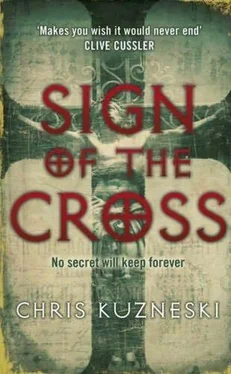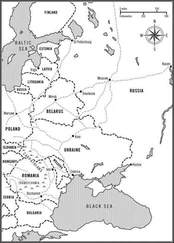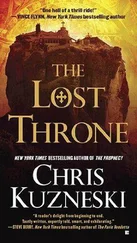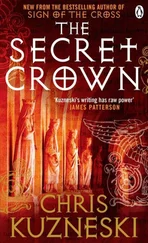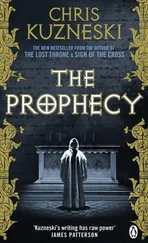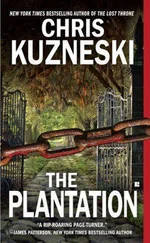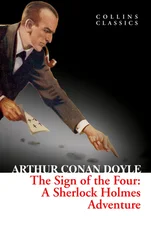Chris Kuzneski - Sign of the Cross
Здесь есть возможность читать онлайн «Chris Kuzneski - Sign of the Cross» весь текст электронной книги совершенно бесплатно (целиком полную версию без сокращений). В некоторых случаях можно слушать аудио, скачать через торрент в формате fb2 и присутствует краткое содержание. Жанр: Фантастика и фэнтези, на английском языке. Описание произведения, (предисловие) а так же отзывы посетителей доступны на портале библиотеки ЛибКат.
- Название:Sign of the Cross
- Автор:
- Жанр:
- Год:неизвестен
- ISBN:нет данных
- Рейтинг книги:3 / 5. Голосов: 1
-
Избранное:Добавить в избранное
- Отзывы:
-
Ваша оценка:
- 60
- 1
- 2
- 3
- 4
- 5
Sign of the Cross: краткое содержание, описание и аннотация
Предлагаем к чтению аннотацию, описание, краткое содержание или предисловие (зависит от того, что написал сам автор книги «Sign of the Cross»). Если вы не нашли необходимую информацию о книге — напишите в комментариях, мы постараемся отыскать её.
Sign of the Cross — читать онлайн бесплатно полную книгу (весь текст) целиком
Ниже представлен текст книги, разбитый по страницам. Система сохранения места последней прочитанной страницы, позволяет с удобством читать онлайн бесплатно книгу «Sign of the Cross», без необходимости каждый раз заново искать на чём Вы остановились. Поставьте закладку, и сможете в любой момент перейти на страницу, на которой закончили чтение.
Интервал:
Закладка:
Payne rolled his eyes at the mock outrage. ‘Just answer him.’
‘Fine,’ he sneered. ‘I saw Boyd on the History Channel. Seems to me he’s a professor at Oxford or one of those fancy-pants English schools. It might’ve been Hogwarts for all I know. Anyway, he was talking about the Roman Empire and how it influenced modern society.’
Manzak wrote a note to himself. ‘What else did you learn?’
‘I never knew the Romans had indoor plumbing. I always thought — ’
He cut him off. ‘I meant about Boyd.’
‘Not much. They used his voice but he rarely appeared on-screen. He was just the narrator.’
Payne rubbed his eyes, trying to play catch-up. ‘Let me get this straight. Dr Boyd is an English archaeologist, someone with enough credibility to teach at a world-famous university and narrate a special on the History Channel?’
Manzak nodded, refusing to give additional information.
‘OK, here’s what I don’t understand. What’s the big emergency here? I mean, why does the Spanish government want this guy so badly that they’re willing to cut a deal with two prisoners? Furthermore, where does the CIA fit into this? Something just doesn’t add up here.’
Manzak gave him a cold, hard stare, one that suggested he wasn’t ready to lay his cards on the table. Nevertheless, Payne stared back, unwilling to back down. He’d been locked up for seventy-two hours and was sick of being jerked around. His aggressiveness paid off moments later when Manzak leaned back in his chair and sighed. A long, drawn-out sigh. A sound that told Payne he had backed his prey into a corner, and he was about to surrender.
Manzak stayed like that for a moment, like he was still trying to decide if it was the right thing to do. Finally, with reluctance on his face, he pushed the folder forward.
‘Dr Charles Boyd is the most wanted criminal in Europe.’
14
Every crime has a command center. Whether it’s a major case or not, there has to be a place for the investigating officers to go to write their reports. Sometimes it’s just a tiny cubicle at headquarters, but there’s always a spot that becomes the heart of an investigation.
But rarely was it this luxurious.
Kronborg’s superintendent wanted to keep Nick Dial happy, so he put him in the Royal Chambers, a series of rooms that served as the royal residence for nearly a hundred years. The suite was built for Frederick II in the 1570s and was filled with the original furnishings. A gold chandelier hung from the ceiling, dangling over the banquet table that served as his desk.
Dial rarely had any privacy when he worked a case so he viewed this as the ultimate luxury, a chance to be alone with his thoughts, if only until someone came looking for one of the files he ‘borrowed’ from the Danish police when they weren’t looking.
Every investigator had a different technique for sorting through evidence, his or her personal way to get a grip on things. Some talked into a tape recorder. Others typed the info into their computer. But neither of those techniques worked for Dial. He was old-school when it came to evidence, eschewing the lure of technology for the simplicity of a bulletin board. To him there was no better way to organize a case. He could move things whenever he wanted until everything fit into place — like a giant jigsaw puzzle that revealed the secret identity of the killer.
The first thing he put on the Kronborg board were photographs of the crime scene. They were taken at a variety of angles and revealed all the little horrors that he would like to forget. The way two of the victim’s ribs had been forced through his skin like broken chopsticks that had been plunged into a pound of raw meat. The way his jaw hung at an impossible angle. The way blood looks when it mixes with urine and feces. That’s the reality of the average homicide, the type of stuff that Dial had to wade through to find the answers he was looking for.
Like finding more information about Erik Jansen. That would be the best way to determine why he was chosen to die. Learn about the victim to learn about the killer. That meant starting with the people who knew Jansen best: his friends, family, and coworkers. Of course, that was more difficult than it sounded since they were scattered all over Europe. Throw in the language barrier and the secrecy of the Vatican, and the degree of difficulty went through the roof.
It would take a team of professionals to get the information he needed.
The first person he phoned was his secretary at Interpol. She was in charge of calling the National Central Bureaus in Oslo and Rome and telling them what Dial needed, then they would contact the local police departments and get the information for him.
Unfortunately, Vatican City wasn’t one of Interpol’s member countries. That meant there wasn’t an NCB office at the pope’s palace. No local contacts meant no insiders. And no insiders meant no information. Agent Nielson had tried to circumvent the problem by calling the Vatican directly, but as Dial had anticipated, no one returned her message.
So Dial decided to call the Vatican himself, hoping his fancy title would get someone on the line. He’d received a long list of phone numbers from Nielson and asked her to break things down according to nationality, figuring Danes and Norwegians would be most willing to help because of their connection to the crime.
After giving it some thought, though, he decided to scrap that idea and go in the opposite direction. Instead of looking at it from the victim’s point of view, he decided to look at it from his own. Who’d be willing to help him ? He needed to find someone he could talk to, someone he could bond with. That was the angle he needed to play, the way to get his foot in the door.
It was far too late to help Erik Jansen. But it wasn’t too late to help Nick Dial.
*
Cardinal Joseph Rose grew up in Texas. He loved guns, red meat, and ice-cold beer. But more than anything else, he loved God, and that was the reason he was willing to move halfway around the world to work for the Vatican. This was his calling, and he was very content.
But that didn’t mean he wasn’t homesick.
When the call came to his office, his assistant told him that Nick Dial was on the phone. The name didn’t ring a bell, so Cardinal Rose asked his assistant what it was about. His assistant shrugged and said Dial wouldn’t tell him. Then he added that Dial had an American accent. Two seconds later, Rose was on the phone. ‘How can I help you, Mr Dial?’
Dial smiled at the Texas twang in the cardinal’s voice. It was music to his ears. ‘Thanks for taking my call, Your Eminence. Please call me Nick.’
‘Thanks, Nick. But only if you call me Joe.’
‘You got it.’
‘So, what part of America are you from?’
‘All over, really. My dad coached college football, so I grew up on campuses from Oregon to Pennsylvania to Florida. Plus I spent a whole lot of time in Texas.’
They spent the next few minutes talking about the Lone Star State before Rose asked, ‘So, what can I do for you? I have to admit I’m curious, since you wouldn’t tell my assistant.’
‘Sorry about that. I thought it would be best if I told you myself.’
‘Told me yourself? That doesn’t sound good.’
‘I’m afraid it’s not. I run the Homicide Division at Interpol, and last night one of your priests was found murdered.’
Rose tried to remain calm. ‘One of my priests? You mean one of my assistants?’
‘Maybe,’ Dial admitted. ‘That’s the reason for my call. We know the victim’s name and that he worked for the Vatican, but I’m having trouble finding out additional — ’
‘His name?’ Rose demanded. ‘Please tell me his name.’
Читать дальшеИнтервал:
Закладка:
Похожие книги на «Sign of the Cross»
Представляем Вашему вниманию похожие книги на «Sign of the Cross» списком для выбора. Мы отобрали схожую по названию и смыслу литературу в надежде предоставить читателям больше вариантов отыскать новые, интересные, ещё непрочитанные произведения.
Обсуждение, отзывы о книге «Sign of the Cross» и просто собственные мнения читателей. Оставьте ваши комментарии, напишите, что Вы думаете о произведении, его смысле или главных героях. Укажите что конкретно понравилось, а что нет, и почему Вы так считаете.
